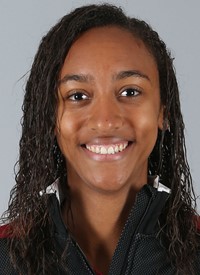@jess_ganga[/author_info] [/author]
If the amount of television time that sports accrue is any indication of actual gender equity in college sports, then a safe assumption could be made that men receive unequal (and more positive) treatment than that of their female counterparts.
But, that may not always be the case.
Although it is true that not many female sports are televised or even talked about for that matter, on college campuses across the country, female athletes are highly regarded on campus like many of the male sports are.

“I am profoundly happy that I attend a school where men and women sports teams are looked at equally,” Ashlynn Fields, a Boston College (BC) middle-distance runner on the Women’s Cross Country/Track & Field team said. “Boston College does a great job at showcasing both groups as best as the university can. Whether it is promoting sporting events for each sport on social media, presenting an Eagle of the Week award once a week to both a male and female athlete or highlighting top performances on our BC Athletics homepage, I believe that there is a great balance between making sure that as many sports teams are acknowledged as possible.”
Fields, who has been running for about eight years, is proud to attend to a university where she doesn’t feel the comparisons of male and female athletes.
Some female athletes, on the other hand, do see a difference in the attention that male sports get compared to female sports, but don’t see it as a negative. In most colleges across the country, football is a popular sport. This is most likely due to the popularity of the sport across the country as a whole, but also because the sport draws in a lot of money, which in turn, helps schools sustain many of their ongoing programs, something that Pennsylvania State University swimmer, Megan Wujciak, is not bothered by.
“People out here in Happy Valley eat, sleep, and breathe Penn State football,” Wujciak said. “It is the culture out here and I think that is part of what makes this university so great. To be honest, if it wasn’t for our football team — who are the ones that bring in the most revenue — a lot of the other sports here probably would not be existent. We have 31 sports teams at Penn State and Penn State football is at the center of it.”
This improved treatment and view of female college sports is most likely due to The Title IX of the

Education Amendments of 1972, which was signed by President Nixon. According to the United State Department of Justice website, Title IX is “a comprehensive federal law that prohibits discrimination on the basis of sex in any federally funded education program or activity. The principle objective of Title IX is to avoid the use of federal money to support sexually discriminatory practices in education programs such as sexual harassment and employment discrimination, and to provide individual citizens effective protection against those practices.”
“I think society is turning though and since Title IX, I truly believe women have gained more attention but not as much as we deserve still,” Fiona Snoddy, a left back and winger for The Louisiana State University (LSU) Women’s Soccer Team, said.
Although the attention of women’s college sports may be getting better, female athletes still face various issues. One issue some people may not realize is the stereotypes that come along with being a female athlete.
“A stereotype that bothers me so much is that they think we are dumb just because we are athletes,” Snoddy said. “I have overheard many times ‘Oh she is an athlete and she’s in our class so it must be super easy.’ This bothers me because unlike the average students we have to handle hour-long practices, hour-long bus rides and hours of studying on top of this.”

Snoddy went on to say that she even experienced similar stereotypes in high school where she played for her school’s soccer team. She explained that most students assumed she chose to attend LSU because she was a good athlete. Snoddy knew, though, that statements like the ones she has heard are untrue.
Some female athletes encounter stereotypes specific to their sport. Fields explained the stereotypes that she believes female runners experience.
“One of the biggest stereotypes within females that run is that the skinner they are the faster they will run,” Fields said. “In addition, a stereotype that female runners face is that because it is a non-contact sport, it is not viewed as competitive as other sports.”
One thing all three women agreed on was how, in general, in society there needs to be more attention on women’s sports. Most of the major sports networks, such as ESPN, CBS and Fox, for example, have continuous coverage and discussions about male sports, but there aren’t enough examinations of women’s sports.
“I believe the promotion of female sports should be highlighted much more than it currently is,” Fields said. “At times, it can be frustrating when sports such as football, men’s ice hockey and men’s basketball are given the top sports channels on TV or the primetime game slots when female teams work just as hard. There are some instances where female teams have had better seasons than the most highlighted male sports teams, yet female teams are still overlooked. This is an issue that has been going on for quite some time and should be improved.”
Like boys, girls also dream of one day being able to play the sport they love professionally, but with not many sports being televised, it is hard for young girls to find the same inspirations that boys have, a point that Wujciak was sure to make.
“You see little boys now-a-days glued to the TV screen on Saturdays watching their favorite college football players and dreaming to be in their shoes one day,” Wujciak said. “The same could happen for women’s sports if they had more publicity and media attention.”
There needs to be an improvent in the attention that women sports get in general. It is beginning with women’s college sports, which is a small step for women’s sports in general. Women athletes work very hard and take pride in the amount of time and energy they put into the sport they love. Most women have been dedicated to the sport they play since they were in high school, some even began playing at a young age.
“Being a student-athlete in college comes with a great deal of responsibility. I am expected to perform to the best of my ability on an athletic level, while maintaining a high academic standard as well,” Fields said. “In general, female athletes are recognized for their strong work ethic and the time commitment that they put into their specific sport.”
Many athletes feel it is such a privilege to play for their college and believe it’s a personal accomplishment. Wujciak feels participating in sports was something her family expected and being able to play in college means she has met those expectations.
“I met these expectations and also did what tons of people told me that I would never be able to do,” Wujciak said. “When I was younger I was constantly asked if I wanted to play sports when I was older and of course I said without hesitation ‘OF COURSE’ and people always said ‘good luck’ while rolling their eyes. Being a college athlete gives me pride in myself in a way that I have worked so hard at something to compete at the next level.”
At the end of the day, all college athletes are proud to be doing what they loved to do and feel lucky to have the opportunity ro represent their college. This is just one other reason that all female athletes should have the attention they deserve: they love what they do and work hard at it.
“Being a college athlete means a lot and is very important to me. I value this opportunity more than anything,” Snoddy said. “It definitely makes me feel like I have to be more mature than the average college student because student-athletes represent their school and have to make sure they represent it well. I am very proud to do what I do and am truly blessed to be in the shoes I am.”
